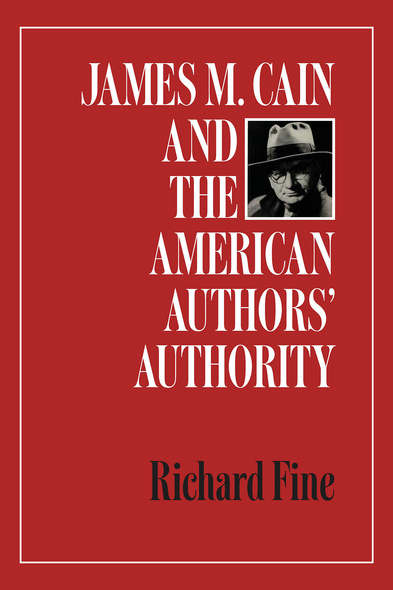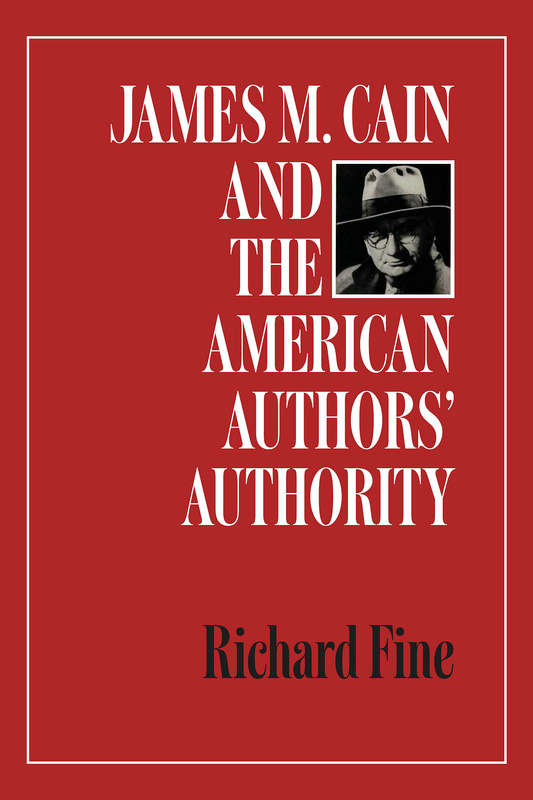James M. Cain and the American Authors' Authority
The 1940s offered ever-increasing outlets for writers in book publishing, magazines, radio, film, and the nascent television industry, but the standard rights arrangements often prevented writers from collecting a fair share of the profits made from their work. To remedy this situation, novelist and screenwriter James M. Cain (The Postman Always Rings Twice,Double Indemnity, Mildred Pierce) proposed that all professional writers, including novelists, playwrights, poets, and screenwriters, should organize into a single cartel that would secure a fairer return on their work from publishers and producers. This organization, conceived and rejected within one turbulent year (1946), was the American Authors' Authority (AAA).
In this groundbreaking work, Richard Fine traces the history of the AAA within the cultural context of the 1940s. After discussing the profession of authorship as it had developed in England and the United States, Fine describes how the AAA, which was to be a central copyright repository, was designed to improve the bargaining position of writers in the literary marketplace, keep track of all rights and royalty arrangements, protect writers' interests in the courts, and lobby for more favorable copyright and tax legislation.
Although simple enough in its design, the AAA proposal ignited a firestorm of controversy, and a major part of Fine's study explores its impact in literary and political circles. Among writers, the AAA exacerbated a split between East and West Coast writers, who disagreed over whether writing should be treated as a money-making business or as an artistic (and poorly paid) calling. Among politicians, a move to unite all writers into a single organization smacked of communism and sowed seeds of distrust that later flowered in the Hollywood blacklists of the McCarthy era.
Drawing insights from the fields of American studies, literature, and Cold War history, Fine's book offers a comprehensive picture of the development of the modern American literary marketplace from the professional writer's perspective. It uncovers the effect of national politics on the affairs of writers, thus illuminating the cultural context in which literature is produced and the institutional forces that affect its production.
...by rescuing the AAA from obscurity and exploring its significance, Fine has performed a useful service for scholars interested in writers and books in modern America.
Begun as a movement to assure American writers of their rights to their own intellectual properties, the American Authors' Authority disintegrated after charges that it was a Communist plot. . . Fine has written a reliable, immensely detailed account of how James M. Cain became point man for the movement, and how it polarized writers—all writers in the country—into a New York versus California dichotomy that is a useful index to American culture of the time.
This study adds materially to our understanding of the profession of authorship in the United States in the immediate post-World War II period .... Moreover, as the author rightly points out, the problems that the AAA was devised to solve still exist, making the study more relevant to the current situation of the American writer than other work in the field.
- Abbreviations
- Preface
- Acknowledgments
- Part 1. The Profession of Authorship
- 1. The Origins of the Profession of Authorship
- 2. James M. Cain and the Literary Marketplace
- 3. Writers Organize (1883–1946)
- Part 2. The American Authors’ Authority
- 4. The Genesis of the American Authors’ Authority (January 1945–July 1946)
- 5. A War of Words (August–October 1946)
- 6. The Second AAA Plan (November 1946–April 1947)
- 7. The Muse and the Mug (May–June 1947)
- 8. The End of the AAA
- Notes
- Bibliography
- Index





